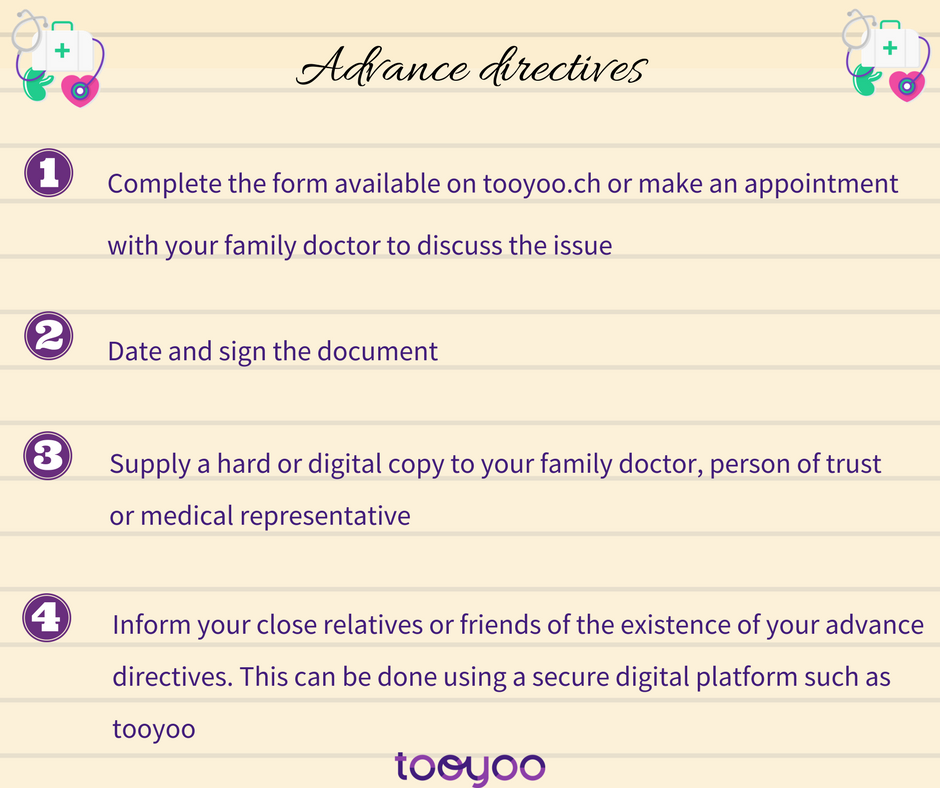Advance directives

Advanced directives are a widely discussed theme but only a very small proportion of the population actually have them. The article will specify exactly what they are and why they are important. It will also look at their legal force and how to approach writing them.

What are the patient decrees? "Patient decrees" are a written and signed document using which a person records their wishes as to the medical treatment and healthcare that they would want to receive if they become unable of making rational decisions or if their state of health precludes them from expressing their wishes. In addition, a medical representative can be authorised to make these care decisions. Advance directives are permanently valid. However, it is recommended to re-sign them every two years, each time adding a new date. Or they can be redrafted if you wish to amend them in any way.
Any person capable of making rational decisions can draft advance directives. They are binding; in other words, doctors and medical teams have a duty to apply the arrangements set out therein in a precise medical situation. These directives are based on the principle of patient autonomy, meaning that patients have the right to make decisions in their own interests, in line with their personal convictions.
What form should the document take? A basic document in writing is sufficient. It must be dated and signed by the patient. It can be a completed form, or a typewritten or handwritten document.
Establish your patient decrees simply and for free on tooyoo.
What kind of issues should be covered by advance directives?
You should record your medical wishes, for example if you wish to be reanimated or otherwise, or if you wish everything to be done to keep you alive. It is also possible to specify whether treatment should be administered depending on the likelihood of regaining the capacity to make rational decisions.
None of these decisions are easy. We must ask analyse our stance on life and death:
- Is it important for me to live longer?
- Am I willing to accept certain constraints (e.g. dependency) to live a few more years?
- Or is my independence more important to me than living to a ripe old age?
- What does the term “dying with dignity” mean to me?
- What role should close relatives or close friends play in these decisions?
Answering these questions means pondering what is meant by quality of life:
- What gives meaning to my life?
- How important is it for me to live pain free?
This kind of question may help you record your wishes clearly. This is far more than a yes or no exercise but rather an analysis of what is acceptable to us and the price we are willing to pay.
Who should write advance directives?
Anyone can write advance directives: people in good health, those who are ill and who are making arrangements for the end of their life, or elderly people who may be facing the prospect of cognitive difficulties.
Although it seems likely that those facing a terminal illness would be more likely to write advance care directives, only 9% of cancer patients for example have done so.
What happens if I have not drafted advance directives?
If no wishes have been formulated, decisions will be made by your close relatives and the doctors treating you, according to the order below. An official document is not always necessary as long as you have already informed your family doctor or your close relatives of your treatment wishes.
Who can make decisions on my behalf?
In a particular case where you are unable to communicate, there is a legally defined order for the people authorised to represent you:
- The person named in the advance directives (medical representative) or in the power of attorney
- The curator assigned to represent the person in all matters medical
- The spouse or civil partner, if they live in the same household or if this person provides regular personal assistance*
- A person living in the same household as the patient and who provides regular personal assistance*
- Descendants if they provide regular personal assistance*
- Father and mother, if they provide regular personal assistance*
- Siblings, if they provide regular personal assistance*
* There is no legal definition of what “regular person assistance” entails. Simply, this seeks to ascertain whether ties genuinely exist between a patient and a close friend or family member.
Where should I keep my advance directives?
There are several possibilities but your advance directives should be easy to find and their existence known of, for when they are needed:
- You can give a copy to your family doctor and ask him or her to note their existence on your health insurance card
- You should inform and supply a copy of the advance directives to your person of trust or medical representative, either in writing or using a secure digital platform such as tooyoo
- Place a note in your purse or wallet informing of the existence of your advance directives, where they are kept and the name of your person of trust
Why is this important?
It is important because it gives you a platform for expressing your choices and wishes; this document will ensure that they are respected. Another reason for drafting advance directives is so that your close relatives will not have to take tough decisions – often in an emergency situation without the necessary information.